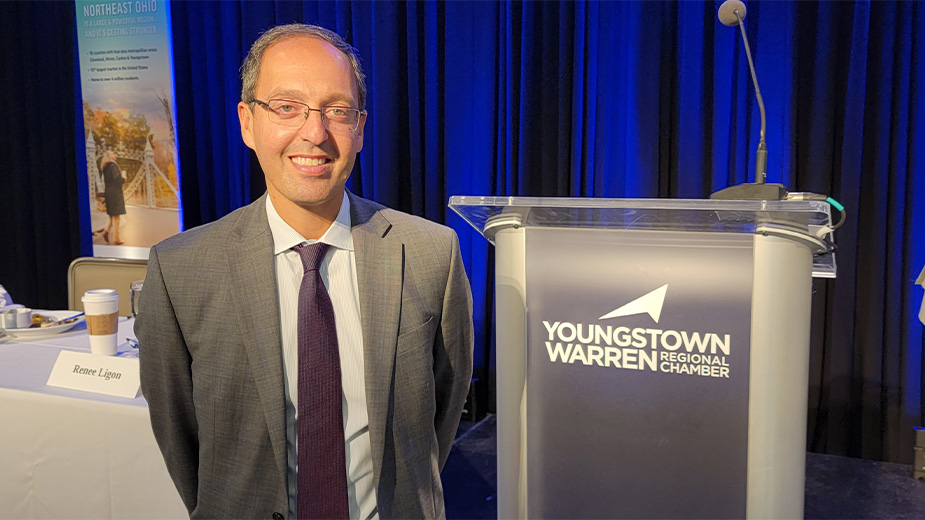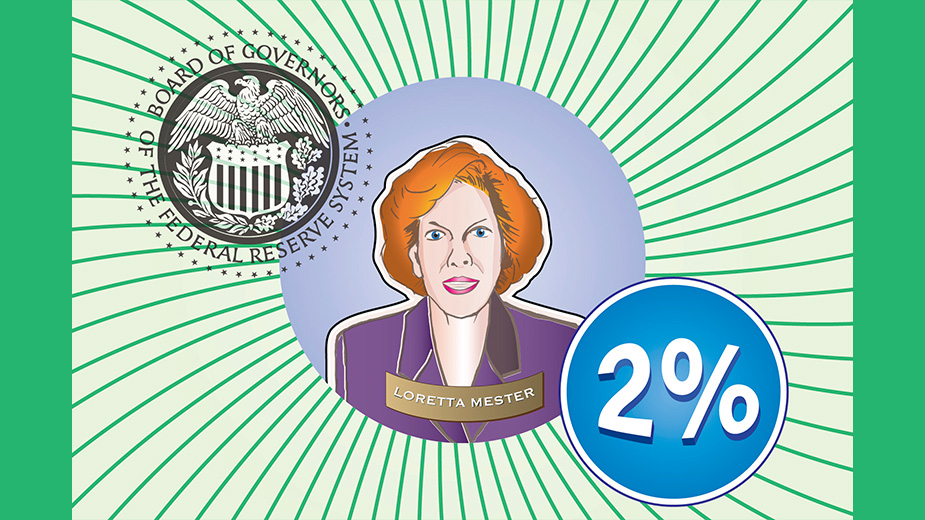FNB Economist Upbeat about US Economy
CANFIELD, Ohio – As long as there are a plentiful number of available jobs in the labor market, the U.S. economy should be able to weather any turbulence by virtue of sustained consumer wealth, an economist for First National Bank said Thursday.
“I’m optimistic,” Ahmed El Nokali, managing director of capital markets at FNB said after delivering remarks at the Youngstown/Warren Regional Chamber’s annual Economic Forecast breakfast at Waypoint 4180. “I know it’s tough to be sometimes when we get the headwinds, but I think from the fundamentals going into 2024, I’m relatively optimistic.”
El Nokali said that should the U.S. economy fall into recession, the overall strength of the banking sector, the surplus of job openings across the country and consumer spending are likely to make it a very short and shallow one.
“We have a labor shortage,” he said. “Under that premise, I do believe with jobs aplenty, the consumer will keep powering the economy forward into 2024 and beyond.”
Today, there are 1.5 jobs available for every one unemployed person in the labor market, he added, down from more than two jobs for every unemployed person earlier in the pandemic recovery.
Those that left the workforce during the pandemic are returning, he said, especially women between ages 25 and 54. “Some are coming back,” he said. “Men’s participation rate is picking up but still has a way to get to levels where we were two decades ago.”
Normally, a recession would lead to job losses, he said. In the case of a “soft landing” or “no landing” situation, the job openings are lost, not the jobs.
Despite high interest rates and inflation, El Nokali said consumers’ net worth increased on average by nearly 40% between 2019 and 2022. That’s important because consumers today represent 70% of the country’s gross domestic product, or GDP.
“I think there’s more of a buffer right now than many people expected,” he said. “The pandemic, the response to the pandemic – I think the money that flooded into the system – it’s been underappreciated.”
Another positive trend El Nokali pointed to is corporate debt and how it was managed during the pandemic. Before the Federal Reserve Bank launched its series of rate hikes beginning last year, many companies took advantage of the low interest rates that were available in the wake of the pandemic and refinanced their debt at a fixed rate.
“Going into this Fed rate hike cycle, we had rock-bottom interest rates,” he said. “Many companies used that opportunity to refinance lock-in rates and kick that well into the future.” Moreover, corporate default rates are far lower than economists would generally expect in a higher interest rate environment.
He noted that the Federal Reserve’s traditional policy of raising interest rates to cool inflation and the economy has not appeared to impact consumer spending or the job market, while corporate profit margins remain healthy.
“We’re in a fantastic spot,” relative to this segment of the economy.
However, there are concerns over the U.S. debt in the long-term, El Nokali said. Demand to purchase U.S. debt appears to be waning, while the government continues to issue more debt at a record clip, he noted.
“That is a worry,” he said. “I think it’s a long-term worry.”
In the short-term, however, it could act as a positive influence on the overall economy from a stimulus perspective.
This optimism is also reflected in local economic trends, according to Guy Coviello, president and CEO of the Youngstown/Warren Regional Chamber.
The amount of economic development project leads have exploded this year, Coviello said, especially those related to megaprojects. These are large-scale developments such as Ultium Cells LLC’s plant in Lordstown, which constituted a $2.3 billion investment and the creation of more than 1,100 jobs.
“Through three quarters of 2023, we’re managing more economic development projects than we’ve ever imagined in the history of doing this.”
Normally, the chamber would receive approximately 50 leads with one megaproject every two years. In 2020, for example, the chamber fielded 55 leads and one megaproject, Coviello said.
Then, in the wake of the pandemic, the chamber witnessed a 20% increase in leads in 2021, three of which were for megaprojects, he said. That trend continued in 2022, with another 20% increase in lead traffic, seven of which were for megaprojects.
“By the end of this year, we’ll probably receive leads for 108 projects.” He said. Through three quarters, the chamber has received 18 leads for megaprojects and expects to field more by the end of 2023.
Over the next two years, Coviello said that those projects completed and under construction are projected to create 1,450 jobs.
Those projects slated for completion over the next two years are expected to create another 3,505 jobs and $1.4 billion in capital expenditures, he said.
Also, Coviello presented data that shows a small reversal of fortune in terms of population trends, housing and poverty rates in the Mahoning Valley.
A USA Today study showed that the Mahoning Valley represented the highest percentage of millennial home ownership in the United States at 74%, Coviello shared. “This is the most critical demographic of our current and future workforce,” he said. Another metric he cited, published recently by U.S. News and World Report, lists the Youngstown-Warren region as the 62nd best place to live in the United States, and was ranked No. 2 in Ohio.
Coviello, who earlier emphasized the Mahoning Valley’s 40-year population bleed, cited a recent Deloitte study that took into account population trends between 2020 and 2021 for the Youngstown-Warren Metropolitan Statistical Area.
The population increased by 1%, Coviello said.
Also, the poverty rate across the Youngstown-Warren MSA declined by 2% while remaining stagnant nationwide, he said. And those in the region who hold a bachelor’s degree or higher in the region also increased during the period, the first time since 2015.
“Given all the other stuff we’ve seen with megaprojects leads with megaprojects still to come online to be a part of our supply chain, I get the feeling that this is a trend,” Coviello said.
Pictured at top: Ahmed El Nokali, managing director of capital markets at First National Bank.
Copyright 2024 The Business Journal, Youngstown, Ohio.



